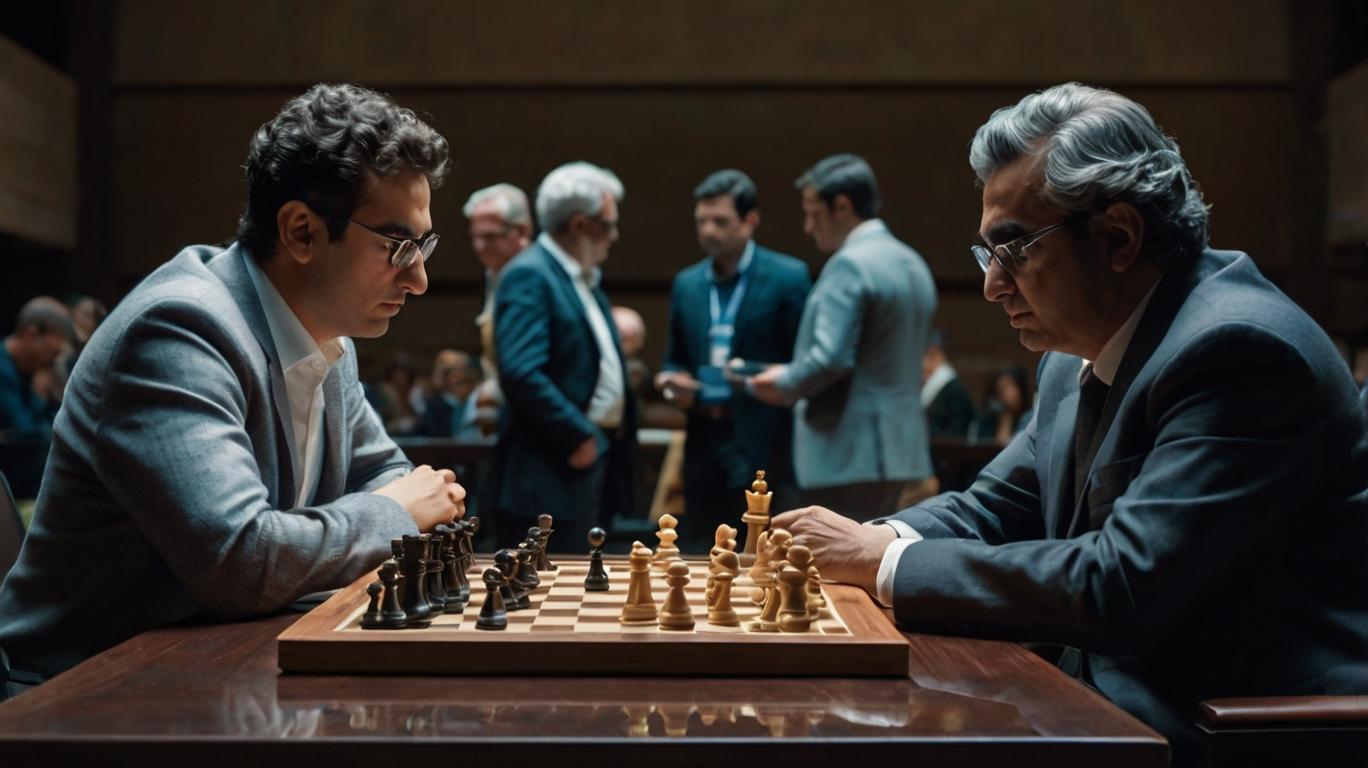- stock image used
Carlsen Approves Gukesh’s Decision – A Controversial Chess Moment
Chess is a game of deep strategy and unexpected turns. A recent match involving young Grandmaster D Gukesh and the experienced Fabiano Caruana turned heads when Gukesh resigned in just 18 moves. This decision led to widespread discussions among chess enthusiasts, and former world champion Magnus Carlsen endorsed Gukesh’s move.
The Context of Gukesh’s Resignation
During the prestigious Freestyle Chess Grand Slam Weissenhaus, Gukesh faced Caruana in an intense battle. An early resignation surprised many, but seasoned players understand that sometimes, cutting your losses early is a strategic decision rather than a defeatist one.
Magnus Carlsen’s Take on Gukesh’s Decision
Carlsen, known for his deep understanding of chess principles, publicly approved Gukesh’s move. According to experts, recognizing a losing position and opting to resign instead of dragging a lost game reflects maturity and understanding of the game.
Fabiano Caruana’s Strategy
Caruana is a well-established grandmaster with years of experience in elite chess. His tactical play against Gukesh displayed supreme attacking strength, compelling Gukesh to concede early. This game will likely be analyzed for years to come.
Resignation in Chess: A Bold or Weak Decision?
Many casual players believe that a resignation in under 20 moves is premature, but in high-level chess, a forced loss can make further play unnecessary. Understanding moments when resignation is acceptable is key to a professional mindset.
Gukesh’s Chess Journey
Gukesh, one of the brightest young talents in chess, has shown immense growth. His decision against Caruana in this game does not undermine his achievements but instead showcases his ability to recognize and respect superior play.
Freestyle Chess Grand Slam Weissenhaus: A Premier Event
Held in Germany, this tournament gathers some of the world’s top players. Gukesh’s participation and Carlsen’s commentary on his choices have brought major attention to this event.
Lessons from Gukesh vs. Caruana Encounter
- Even top grandmasters lose sometimes.
- Resigning early can be a strategic decision.
- Carlsen’s expertise in analyzing games provides valuable insights.
- This game contributes to ongoing chess theory discussions.
Comparisons with Past Chess Resignations
Many historical chess matches have seen early resignations. Looking at games from legends like Kasparov, Fischer, and Anand shows similar situations where resignation was the most sensible option.
How Chess Engines Analyzed the Match
Engines like Stockfish and AlphaZero provided insights into Gukesh’s position. After move 18, most engines gave Caruana an overwhelming advantage, justifying Gukesh’s resignation.
Fan Reactions to the Match
Chess fans took to social media platforms like Twitter and Reddit to debate Gukesh’s decision. Some called it premature, while others called it a wise strategy. Carlsen’s approval carried significant weight in favor of Gukesh.
The Pragmatism Behind Carlsen’s Approval
Carlsen, known for his strategic brilliance, has always been vocal about practical decisions in chess. His endorsement makes Gukesh’s decision more understandable rather than seemingly weak.
Gukesh’s Road Ahead in Chess
Despite this loss, Gukesh continues to rise in FIDE rankings. A single loss, even a notable one, does not define a player’s career but instead offers a learning moment.
What This Means for the Future of Chess
Chess is evolving. Players nowadays focus more on practical results rather than unnecessary prolongation of games. This approach, endorsed by Carlsen himself, is shaping modern chess strategy.
Impact of Carlsen’s Opinion on Young Players
For up-and-coming chess players, Carlsen’s words act as guidance. Players like Gukesh take inspiration from Carlsen’s understanding of the game, showing how the world champion influences the next generation.
Looking at the Psychological Aspect of Early Resignation
Chess is not just about moves but also a psychological battle. Recognizing defeat early instead of forcing a mentally exhausting defense can help players stay energized for future games.
Why This Match Will Be Remembered
The early resignation move will be discussed for years, not because it was a mistake, but because it highlights the evolving strategic mindsets in modern chess.
Final Thoughts on Carlsen’s Support for Gukesh
Gukesh’s decision against Caruana and Carlsen’s approval of it reinforces the evolving nature of chess and strategy. As chess continues to grow, such moments define competitive chess today.
Carlsen Approves Gukesh’s Decision – Entertaining Lesser-Known Facts
Chess fans worldwide were stunned when young Grandmaster D Gukesh resigned early in his showdown against Fabiano Caruana. However, the shockwave intensified when the legendary Magnus Carlsen openly approved Gukesh’s decision.
Let’s dive into some of the most interesting lesser-known facts about the players, event, and locations that shaped this historical moment.
The Grandmaster Trio: Carlsen, Gukesh & Caruana
1. Magnus Carlsen’s Hidden Poker Skills: Did you know Carlsen once played poker at a competitive level? His ability to read opponents in chess translates well into poker strategy.
2. Gukesh Almost Became the Youngest GM Ever: Gukesh was just 12 years old when he came close to breaking Sergey Karjakin’s record as the youngest chess Grandmaster ever!
3. Caruana’s Secret to Focus – Classical Music: Fabiano Caruana often listens to Beethoven and Bach before a match to calm his nerves and improve concentration.
Fascinating Facts About Freestyle Chess Grand Slam Weissenhaus
4. A Tournament in a Fairytale Setting: The Weissenhaus Grand Slam is not just any chess event. It is held in an actual 400-year-old castle turned luxury resort in Germany!
5. Invitation-Only: Not Everyone Can Play! Unlike most chess tournaments, this event is extremely exclusive and invites only the creme de la creme of chess GMs.
6. Unconventional Rules Spice Up the Game: The event has experimented with rule variations like Freestyle Chess where players can use computer assistance before making decisions.
Shocking Resignations in Chess History
7. Fastest Resignation in Top-Level Chess: In the 1923 Monte Carlo tournament, a player resigned after one move—though it was due to a serious mistake and not strategy!
8. Fischer’s No-Show Resignation: Bobby Fischer famously “resigned” against Spassky in the 1972 World Championship by not even showing up for Game 2!
9. Kasparov’s Controversial Loss: In 2005, Garry Kasparov played his last official game and resigned in shock against Topalov, walking away from professional chess forever.
Why Did Carlsen Approve Gukesh’s Resignation?
10. A Sign of Chess Maturity: Carlsen has always admired players who recognize a lost position instead of dragging out an inevitable defeat.
11. Psychological Advantage: By resigning early, Gukesh avoided a long and mentally draining defense, saving energy for future games.
12. Chess Engines Agree! AI programs like Stockfish and AlphaZero also showed that Caruana had a commanding edge, validating Gukesh’s early resignation.
Unusual Facts About Chess Strategy
13. Losing on Purpose? Chess Hustlers: In street chess, some hustlers will purposely lose early to trick their opponent into betting larger sums for a rematch.
14. The Shortest Checkmate (Fool’s Mate): Did you know that the fastest way to lose in chess takes only two moves? It’s called “Fool’s Mate.”
15. Magnus Carlsen’s 10,000 Hour Rule: Carlsen once stated that he trained for 10,000+ hours before he even reached GM level!
What This Controversy Means for Chess
16. Changing Strategies in Modern Chess: With AI now analyzing games in real-time, resignations are becoming more accepted as a strategic choice.
17. Carlsen vs. Caruana Rivalry Continues: This game added another chapter to the long-standing Carlsen-Caruana rivalry that’s captivated chess lovers for years.
18. Gukesh’s Resilience: Despite this resignation, experts predict Gukesh will continue to rise in the FIDE world rankings.
Conclusion: A Lesson in Chess Psychology
Gukesh’s decision to resign early was not an act of weakness but a demonstration of his sharp strategic mind. With Carlsen backing his choice, this moment will be talked about in the chess community for years.
What do you think? Would you have resigned early, or would you have tried to fight on?
📜 Legal Disclaimer
This blog is intended for informational and entertainment purposes only. The opinions expressed here are not affiliated with FIDE, any chess organizations, or the individuals mentioned. The content is based on public sources and does not contain proprietary or insider information. Readers should always verify facts independently before forming opinions.
“`






